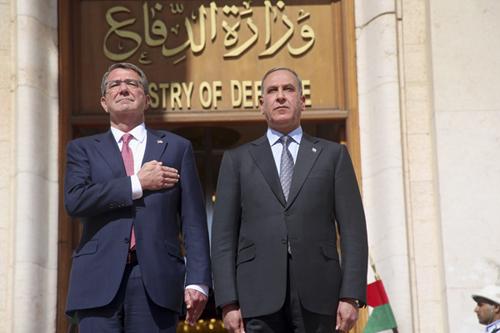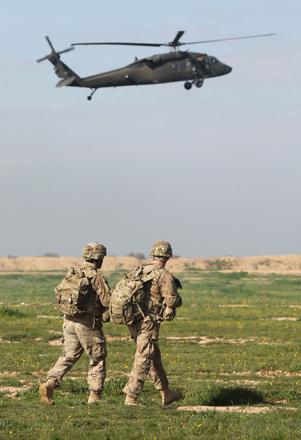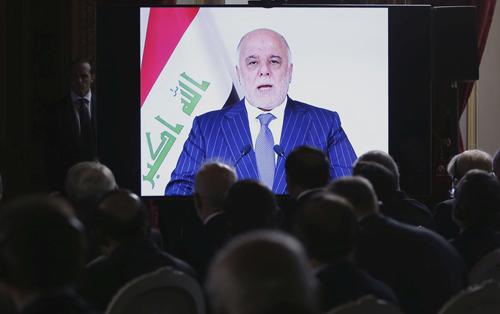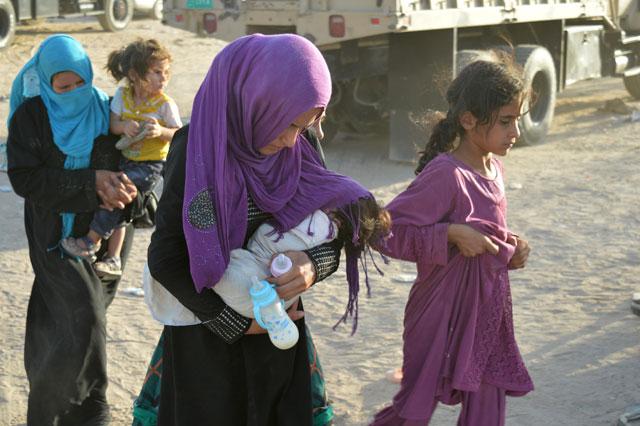You are here
US to send more troops to Iraq, escalating war against Daesh
By Reuters - Apr 18,2016 - Last updated at Apr 18,2016

Visiting US Defence Secretary Ash Carter (left) and his Iraqi counterpart Khaled Al Obeidi stand for their country’s national anthems during a welcome ceremony at the ministry of defence, Baghdad, Iraq, on Monday (AP photo)
BAGHDAD — The United States will send more troops to Iraq, potentially putting them closer to the front lines to advise Iraqi forces in the war against Daesh militants.
US Defence Secretary Ash Carter made the announcement on Monday during a visit to Baghdad in which he met US commanders, Iraqi Prime Minister Haider Al Abadi, and Iraqi Defence Minister Khaled Al Obeidi.
The additional support comes with Iraq engulfed in a political crisis over anti-corruption reforms that is crippling state institutions and threatening to slow the military campaign against the militants.
Iraq's parliament has failed three times to vote on a Cabinet overhaul sought by Abadi to stem graft.
About 200 additional troops will be deployed, raising the number of US troops in Iraq to about 4,100, a senior US defence official said. The Pentagon will also provide up to $415 million to Kurdish military units.
Lieutenant General Sean MacFarland, head of the US-led coalition battling Daesh, said the United States would discuss how the funding would be spent with the Kurdish government, but that part of it would likely be spent on food for the Kurdish peshmerga forces.
"Right now the peshmerga are not getting enough calories to keep them in the field, so we're very interested in making sure that they have enough food just to carry on the fight," he said.
Carter did not meet Kurdish leaders during his visit, but spoke with the president of the Kurdish region, Massoud Barzani, by telephone.
Monday's announcement is the latest move in the past several months by the United States to step up its campaign against the extremists. US special forces are also deployed in Iraq and Syria as part of the campaign.
Iraqi forces — trained by the US military and backed by air strikes from a US-led coalition — have managed since December to take back territory from Daesh, which seized swathes of Iraqi and Syrian territory in 2014.
Escalating support
Some US troops already in Iraq will be shifted to establishing logistics for Iraqi forces as they move up towards Mosul, Carter said. Such logistics include establishing food and other supply lines, particularly important as Mosul is 400km north of Baghdad.
"We're on the same page with the Iraqi government," Carter told reporters. "We want more action by Iraqi forces towards victory here and more action will require more logistics."
The new US troops will consist of advisers, trainers, aviation support crew, and security forces. Most of the new military advisers are expected to be army special forces, as is the case with the approximately 100 advisers now in Iraq.
The advisers will be allowed to accompany smaller Iraqi units of about 2,500 troops that are closer to the frontlines of battle, whereas now they are limited to larger divisions of about 10,000 troops located further from the battlefield.
That will allow the US military to offer quicker and more nimble advice to Iraqi troops as they try to retake Mosul, the largest Iraqi city still under Daesh control.
But by placing them closer to the conflict, it could leave them more vulnerable to enemy mortars and artillery.
"This will put Americans closer to the action," Carter said. "Their whole purpose is to be able to help those forces respond in a more agile way.
The United States has also authorised the use of Apache attack helicopters to support Iraqi forces in retaking Mosul, Carter said. The United States had originally offered the Apaches to the Iraqi government in December.
The Iraqis did not take up the offer then but Carter said Abadi had agreed that the United States would provide the use of the Apaches as the campaign to retake Mosul progresses.
The United States will also deploy an additional long-range rocket artillery unit to support Iraqi ground forces in the battle for Mosul, Carter said. There are two such batteries already in place in Iraq.
Related Articles
ALBUQUERQUE, United States — The United States is sending about 600 extra troops to Iraq to train local forces for an upcoming offensive on
BAGHDAD — US Defence Secretary Ash Carter’s push for Iraq to let Turkey play a role in the battle to retake Mosul from the Daesh terror grou
BAGHDAD — Pentagon Chief Ashton Carter said Monday that Washington will deploy 560 additional troops to aid Iraq's fight to retake Mosul fro



















